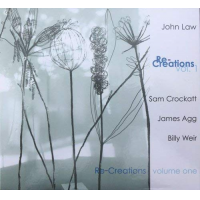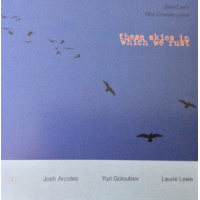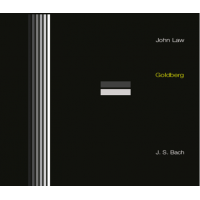Home » Search Center » Results: John Law
Results for "John Law"
Results for pages tagged "John Law"...
John Law

John Law started classical piano aged four and performed first in public at six. After winning an Open Scholarship he studied piano and composition at the Royal Academy of Music, London, where he won prizes for piano playing. Despite then winning an Austrian government scholarship to study in Vienna with the pianist Badura-Skoda, and receiving encouragement from an early classical influence, pianist Alfred Brendel, he turned to jazz in 1986, forming his first group ATLAS, a mainly freely-improvising trio with Paul Rogers, bass and Mark Sanders, drums.
From 1986 to 1996 John concentrated more on the experimental end of jazz, particularly in his association with the South African drummer Louis Moholo, with the Jon Lloyd Quartet and with his own quartet. The John Law/Louis Moholo Duo recorded the acclaimed CD em>The Boat Is Sinking, Apartheid Is Sinking (Impetus 19322), appeared on British radio and toured extensively in the UK, Germany, Holland, Belgium, France and Canada, appearing at many major festivals. The Jon Lloyd Quartet appeared on British radio, made three acclaimed CDs, the last for Hat Hut called By Confusion, and played at festivals, including the 1995 FMP Festival, Berlin. With his own small groups John recorded and toured in the UK, Germany, Holland, Belgium, Austria, Italy, Russia, Lithuania and Belarus, including many festivals. A later quartet, formed 1993, with Paul Dunmall (saxophones), Barry Guy (double-bass) and Louis Moholo, called Extremely Quartet, toured the UK and appeared to great acclaim at the 1998 Nickelsdorf Festival, Austria. They released the CD Extremely Quartet (Hat Hut CD6199) in 1997. John was also involved occasionally during this period with the Evan Parker Quartet. One-off collaborations also included the Dedication Orchestra, a duo performance with the pianist Keith Tippett and a London Festival concert in a septet with David Murray and Chico Freeman.
While John Law was exploring the more radical and freely improvised areas of jazz he also began a series of solo CDs which were to lead him back to an exploration of his classical roots. The four-CD series Chants (Cornucopia, 1993), Talitha Cumi (FMR, 1994), Pentecost (FMR, 1996) and The Hours (FMR, 1997) Thanatos (FMR, 1997) was based on plainchant and, as well as jazz, explored the history and techniques associated with classical piano as well as introducing certain harmonic elements derived from early and mediaeval music. The CDs received outstanding reviews around the world. Concentrating on this music, John gave concerts in the UK in concert halls, churches and universities, and appeared at major festivals in London, Le Mans and Clusone.
From 1996, moving away from the freer end of jazz, John Law began to be more involved with straighter jazz and composition. He formed the trio with Tim Wells (bass) and Paul Clarvis (drums, percussion). This group recorded four critically-acclaimed CDs, one of them, The Onliest, exploring the music of Thelonious Monk. They toured the UK and appeared at festivals in England and France. Later, the drummer Dave Wickins came into the trio and this group gave concerts in the UK and Germany.
In 2000 John created the project Abacus, featuring US drummer Gerry Hemingway and, with Jon Lloyd and Tim Wells also included, this group became the continuation of the Jon Lloyd Quartet, performing both John Law's more radical compositions as well as material by Jon Lloyd. This quartet recorded the acclaimed CD Abacus (hatOLOGY) which received two awards from the French magazine Jazzman, one awarded for the year 2001. The group toured the UK in 2000, appearing at the Bath International Festival.
In 2001, continuing to develop his own approach to the jazz language, John Law formed The Moment Band with his trio and featuring the British saxophonist Tim Garland. The quartet recorded the outstandingly acclaimed CD The Moment (FMR) and toured the UK in 2001. With his trio (with Dave Wickins and now Alec Dankworth on bass) and with featured soloists (Julian Siegel, Martin Speake, Julian Nicholas) John Law undertook, in 2002, the Monk 'n' Junk Tour in the UK, contrasting the compositions of Thelonious Monk with the standard repertoire. A CD of this material appeared on the label ASC in 2006.
2002/3 saw John working in two completely different areas. Returning to more radical, open music, John started a collaboration with the German drummer Klaus Kugel, appearing together at the International Vilnius Festival with the Lithuanian soprano saxophonist Petras Vysniauskas in a triumphant concert to a packed Vilnius Philharmonic Hall and later touring the UK with him in a European quintet including Jon Lloyd and the bass clarinetist Michel Pilz, as well as appearing with him in a quartet at the Portuguese festival in Coimbra. At the same time, moving in the opposite direction into more accessible territory, John worked in two new duos: Songs, with the alto saxophonist Martin Speake, exploring some of their favorite compositions by other people, including arrangements of classical pieces by Ravel, Tchaikovsky and Mahler and in a two piano duo with the pianist Jason Rebello, opening their concerts with Bach and closing with Ravel's Bolero.
Configuration

By John Law
Label: Ubuntu Music
Released: 2020
Track listing: The Kiss; And Them; Configuration; Scandinavian Lullaby; Processional; Jazzshh...; Disfigured Bass; Through
A Glass Darkly; Complex City; These Rolling Clouds; The Kiss (Memory Of A Kiss).
The Pat Metheny Songbook - A New Jazz Canon, Part 1

by Ludovico Granvassu
This week we launch a series of episodes that, from time to time, we'll look at the work of contemporary jazz players as composers, rather than performers, from Tim Berne to Geri Allen, Bill Frisell, Carla Bley, John Zorn, Brad Mehldau and many more. We are starting this series with Pat Metheny, the author ...
John Law's Congregation: Configuration

by Bruce Lindsay
John Law's Congregation is a quartet led by British pianist and composer Law and completed by three musicians from the UK jazz scene--James Mainwaring (Roller Trio), Ashley John Long and Billy Weir--who are part of what Brian Morton's sleeve notes calls the “new generation players." Law has been performing since the 1980s, releasing over ...
John Law: The Re-Creations Trilogy

by Jakob Baekgaard
John Law is one of the most prominent pianists on the British jazz scene and he is also a distinctive composer. So far, he has focused primarily on building a substantial compositional body of work, culminating in his ambitious Art of Sound tetralogy (33 Jazz, 2007-2009), followed by strong records like Three Leaps of the Gazelle ...
Matthew Shipp Trio: Piano Song

by Jakob Baekgaard
Depending on your perspective, tradition can both be a blessing and a burden. Especially in jazz, it is hard to say something new and this is true as well when it comes to the noble art of the piano trio. Thelonious Monk has been there, Bill Evans has been there and Cecil Taylor has been there--just ...
Jakob Baekgaard's Best of 2015

by Jakob Baekgaard
These ten albums are just a few of the many great releases of 2015. Music was and still is a light in a world filled with problems and fear. When it is best, it encourages openness and contemplation and brings us closer together as humans. John Law These Skies In Which We ...
Goldberg

By John Law
Label: 33xtreme
Released: 2015
Track listing: Opening; Aria; Variation 1; Variation 2; Variation 3; Variation
4; Variation 5; Variation 6; Variation 7; Variation 8; Variation
9; Variation 10; Variation 11; Variation 12; Variation 13;
Variation 14; Variation 15; Variation 16; Variation 17; Variation
18; Variation 19; Variation 20; Variation 21;
Variation 22; Variation 23; Variation 24; Variation 25; Variation
26; Variation 27; Variation 28; Variation 29; Variation 30; Aria;
Closing.
John Law: Goldberg

by Jakob Baekgaard
J.S. Bach's The Goldberg Variations is one of the most famous works in the literature of the piano and an endless source of inspiration for pianist around the world -and not only classical pianists. Bach's music simply transcends genres and his ability to develop and sculpt variations on a theme remain unsurpassed. It is no coincidence ...
John Law's New Congregation: These Skies In Which We Rust

by Jakob Baekgaard
One of the things that is characteristic about British pianist John Law is that he does not stand still. He keeps on studying music and constantly adds new sounds and expressions to his vocabulary. So far, his career has included many highlights, among them, a series of solo piano albums influenced by plainchant ...


















